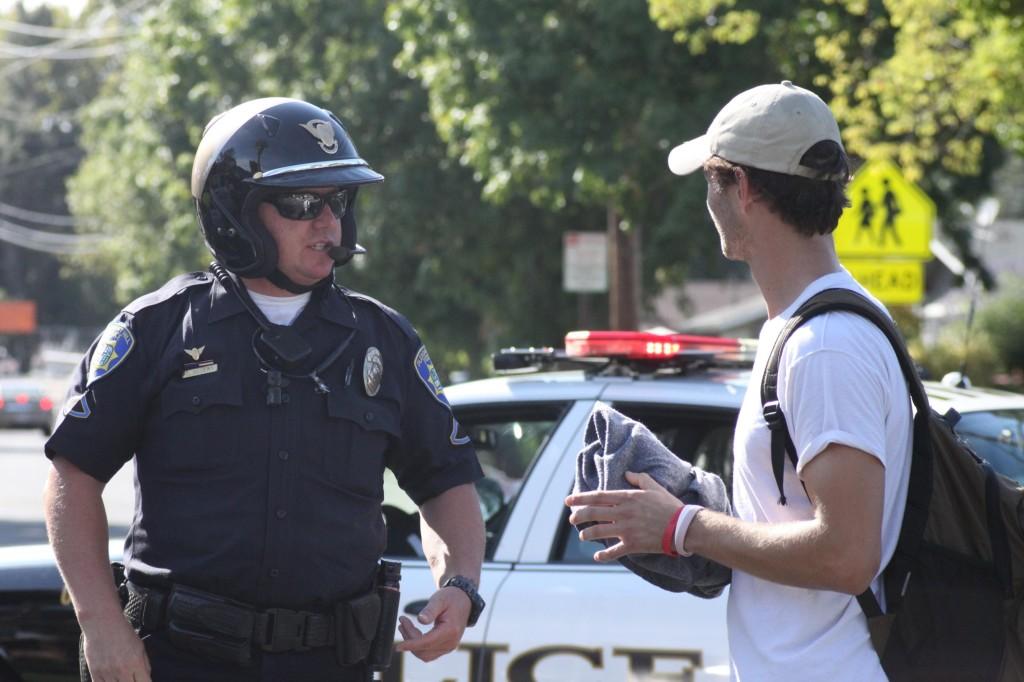DVC was evacuated on Thursday, Sept. 29 as a result of a gas leak near campus. However, opinions on how the evacuation went have been mixed.
As previously reported by the Inquirer staff and posted online, a three-inch gas line on the corner of Viking and Ruth was accidentally cut. According to Director of Marketing and Communications Chrisanne Knox, the leak made a loud hissing noise that could be heard on the southeast corner of campus, over by the football field.
Student Maria Gusenkov noticed that there was something amiss around 2:45. “I saw the football team running away from the field. I thought it was just a routine, but they were yelling and some of them had bandanas or their shirts over their mouths.”
At 3:03 p.m., Gusenkov got a text from a friend who was an architectural engineer, who told her that there was a gas leak and to shelter in place. Around the same time, DVC’s Twitter page retweeted a post from the Contra Costa Times with a similar message.
An email from DVC President Peter Garcia informing staff of an evacuation was sent out at 3:22 p.m. According to him, “police, safety monitors, and a group of managers, classified, and students working out of the President’s office” began to evacuate students towards the north end of campus around this time.
At 3:40 p.m., DVC’s Facebook and Twitter page both reported that classes had been canceled for the rest of the day.
However, official information on the incident at the time was scarce. Math professor Patty Leitner expressed her frustrations in an email sent out to DVC faculty. She noted that instructors were notified of the problem via email and thus were left out of the loop if they were busy teaching.
“There was nothing official,” Leitner said. “I just heard [about the gas leak] third-hand from another teacher and I went back to my class to stay with them.”
Leitner also noted that around 3:25 p.m., a police officer “briefly burst into my classroom and told us to leave the campus, giving one sentence of directions that were spoken so quickly that we couldn’t understand him.”
Music student Neill Castro was concerned with what other students were doing during the evacuation. “Outside I saw some people smoking, which I thought was pretty stupid.”
DVC student and photographer Gustavo Vasquez was leaving his photography class at around 3:30 p.m. when he saw students who were evacuating in the parking lot. “[The evacuation] didn’t seem organized to me,” he said. “People had cars on the other side of campus, and people were outside when they were told to be inside.”
The emergency siren did not go off during the gas leak. According to Knox, this had to do with the decision to evacuate rather than to shelter in place.
“Since the gas leak happened off campus,” Knox said, “we were responding [to other groups] rather than deciding [what to do].”
According to Knox, the siren is used only to alert people to shelter in place. In the end, the college president and the police department decided to evacuate the campus rather than to have students shelter in place (on the advice of the Pleasant Hill Police Department), and so the alarm did not sound.
When asked for comment in regards to the evacuation, the campus police were unavailable for comment.
There were also concerns over traffic. Gusenkov said that she “got caught in the worst traffic ever. There were people walking around which didn’t help manners.”
Student Jorge Alvarado posted on the DVC Facebook page that DVC should “reconsider” their evacuation plan. “It should not take over 20 minutes for students to get in their car and find a way off of campus. Imagine if something worse had happened.”
However, DSS Testing Accommodation Coordinator Ron Tenty did not have traffic issues. He was told to clear the building and “got [off campus] in 10 minutes.”
He only heard about the traffic jam the next day.
Castro’s car was in the music parking lot, over by the gas leak. He decided to relax instead of evacuating. “I got my backpack and went over to the park by Safeway. I got a text from my mom saying it was all clear and then I left.”
DVC President Peter Garcia said that traffic was bad, but there was a reason. “The gas leak eliminated 25 percent of our normal roadways for exit. Half of Viking was closed. … In this evacuation, walking rather than driving would have been a more efficient manner to distance oneself from the most dangerous area.”
President Garcia believes that “on many levels…we were successful, but our ongoing challenge will be to improve our plans for the problems that have been noted like traffic jams and uneven communications.”
In response to feedback, Garcia said that “we need to better coordinate our various phone, internet, and face-to-face efforts to avoid redundancy and accomplish complete coverage [of information].”
He also noted that in order to do this, “we will need more DVC responders for this effort. … Every employee should eventually have a role and understand what we expect of them in every situation.”
Also, he was working on a “staff development and communication plan” to accomplish this. In addition, Knox is working on logistics to “make the president’s office a more effective center for directing communications and coordination” in his words.






































































